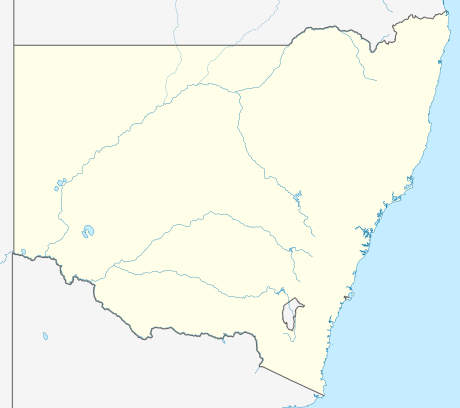The Oaks Airfield
| The Oaks Airfield The Oaks Community Airport | |||||||||||||||
|---|---|---|---|---|---|---|---|---|---|---|---|---|---|---|---|
| IATA: none – ICAO: YOAS | |||||||||||||||
| Summary | |||||||||||||||
| Airport type | Private | ||||||||||||||
| Owner | Graeme Onus | ||||||||||||||
| Serves | The Oaks, New South Wales, Greater Sydney | ||||||||||||||
| Location | The Oaks, New South Wales | ||||||||||||||
| Elevation AMSL | 880 ft / 268 m | ||||||||||||||
| Coordinates | 34°05′02″S 150°33′36″E / 34.08389°S 150.56000°ECoordinates: 34°05′02″S 150°33′36″E / 34.08389°S 150.56000°E | ||||||||||||||
| Website | www.theoaksairport.com | ||||||||||||||
| Map | |||||||||||||||
 YOAS Location in New South Wales | |||||||||||||||
| Runways | |||||||||||||||
| |||||||||||||||
| Statistics (2011) | |||||||||||||||
| |||||||||||||||
The Oaks Airfield is an unlicensed private airfield located in The Oaks, New South Wales in the Wollondilly Shire, west of Sydney Australia. Originally built by the Royal Australian Air Force (RAAF) during World War II, today the airfield caters mostly to recreational aircraft and flight training and is home to the Sydney Recreational Flying Club. The airfield is a heritage listed site and is the only satellite airfield constructed during the war in greater Sydney to still be in used for aviation activities.
History
The Oaks airfield was constructed in 1942 as a satellite field of Camden Airport, at the time a major operational base and RAAF station. The Oaks was built with a sealed 5,000 ft (1,500 m) runway and could function as a dispersal base to hide aircraft should the major bases in Sydney come under attack.[1] The construction of Burragorang Road between the late 1940s and 1960 as the main access to Warragamba Dam cut across the original runway, and only the southern end of the site is still used for aviation purposes.
The current owner purchased the airfield in 1975. In late 1981, the owner acquired a Hawker-Siddeley HS.125 training jet from Qantas and transported it to the field.[2] The derelict jet has since become a popular attraction with aviation enthusiasts and photographers. In 1985, the Sydney Ultralight Flying Club was formed and began using The Oaks as a base for operations.[3]
On 21 September 2009, the Wollondilly Shire Council approved the construction of a 35 m (115 ft) telecommunications tower in McIntosh Street, The Oaks, within the circuit area for the airfield, at a distance of approximately 150 m (490 ft) from the runway edge. A judgement by the Supreme Court of New South Wales handed down on 10 February 2011 restricted the height of any tower on the approved site to be limited to a maximum height of 18 m (59 ft) thus reducing the impact on airport operations and the risk of a collision.[4]
Facilities and operations
The airport has three grass runways, 2 parallel 850 m × 45 m (2,789 ft × 148 ft) strips aligned north-south and a much shorter east-west strip just 400 m (1,312 ft) used only for emergencies. As the airport is not a licensed aerodrome and does not have a control tower, simultaneous operations on parallel runways are not permitted, so only one of these strips is in use at any one time, adopting the designation 18/36. The unused strip is allowed to lie fallow to maintain the runway surface. The airfield is generally restricted to aircraft with a Maximum Takeoff Weight under 5,700 kg (12,600 lb).[4] There is no runway lighting so operations are limited to daylight hours. Pilots use a Common Traffic Advisory Frequency to coordinate arrivals and departures. The nearby, Oaks Township is an important landmark for visual flight rules pilots when approaching Camden Airport, placing this Aircraft Landing Area their approach-path.
The primary user of The Oaks is Dave's Flying School, a Recreational Aviation Australia accredited flying school, which offers students an alternative to the congested Bankstown and Camden airports for initial flight training in the Sydney area.[5] The Sydney Recreational Flying Club [6] also uses the airfield, mainly on weekends. The Southern Cross Gliding Club regularly use The Oaks as an alternative field for training and emergency purposes.[7] Approximately 80% of the movements at the airport (on average 200 per day) are conducted as flight training. The airfield is also used for balloon and parachute operations, as well as supporting aircraft operations by the New South Wales Police Force, National Parks and Wildlife Service and Australian Defence Force. The Oaks is an emergency alternative to Camden and Bankstown for general aviation traffic and there are no special permits required to land.
Future
The owner of the airfield has expressed a desire to restore the World War II site and incorporate an aviation and transport museum. As of 2009, the owner and management are working with the Civil Aviation Safety Authority to upgrade The Oaks airfield as a registered airport to increase the scope of operations.[8] Infrastructure Australia conducted analysis on a potential site close in the immediate vicinity of The Oaks Airfield for a second Sydney airport, however it was not selected as a suitable site.[9]
See also
References
- ↑ "World War II Aerodromes and Landing Grounds in NSW (appendix F and G)" (PDF). NSW Heritage Office. Retrieved 17 July 2012.
- ↑ "VH-ECE. Hawker Siddeley HS-125-3B. c/n 25062.". aussieairliners.org website. Retrieved 18 July 2012.
- ↑ "Sydney Recreational Flying Club homepage". Retrieved 17 July 2012.
- 1 2 "Onus v Telstra Corporation Limited (2011) NSWSC 33". Supreme Court of New South Wales. Retrieved 18 May 2012.
- ↑ "Dave's Flying School homepage". Retrieved 18 July 2012.
- ↑ "Sydney Recreation flying Club". Retrieved 18 July 2012.
- ↑ "Untitled correspondence from President of Southern Cross Gliding Club" (PDF). The Oaks Airport web page. Retrieved 18 July 2012.
- ↑ Campbell, D (29 September 2009). "The Oaks phone tower throws spanner in airport's restoration works". The Macarthur Chronicle. Retrieved 18 July 2012.
- ↑ "Joint Study on Aviation Capacity for the Sydney Region (appendices)" (PDF). Infrastructure Australia. 2 March 2012. Retrieved 17 July 2012.